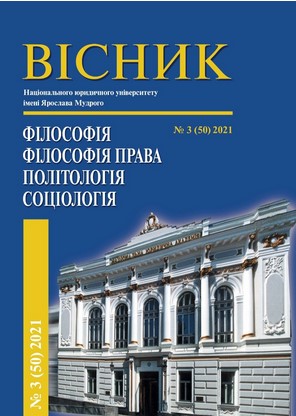МЕТОД ДЕКОНСТРУКЦИИ В НАРРАЦИИ И ИНТЕРПРЕТАЦИИ ПРАВА
THE METHOD OF DECONSTRUCTION IN THE NARRATION AND INTERPRETATION OF LAW
Author(s): J. V. MelyakovaSubject(s): Philosophy of Law, Hermeneutics, Ontology
Published by: Національний юридичний університет імені Ярослава Мудрого
Keywords: narrative discourse; metalaw; dynamism of law; corporality of law; intertextuality; information communication space; deconstruction;
Summary/Abstract: The research is the philosophical and legal nature, are performed within the scope of the ontological hermeneutics within a philosophical paradigm of postmodernism and legal intersubjectivity. This is theoretical justification for the deconstruction of legal metatext. The method of deconstruction ranges positivist canons of law storytelling and opens up new possibilities of understanding law. Integration, transcommunicative processes that occur in the world today, require a legal assessment and interpretation, and simultaneously convert the modern law. The law has to be exercised on the principles of intersubjectivity, self-regulation, discursively and openness. In domestic society, the law has still not acquired the status of an absolute criterion of fairness and priority among other social regulators. Existing systems and mechanisms for the application of the law still remain in the captivity of legal positivism and administrative dependence. General post-non-classical tendencies in science and culture make the isolation of law from the new methodology is impossible. The law must take its place in politicni reality. Today, the reality is assessed as virtualized communication, understanding and representation. Legal reality is presented as a space of open discourse on many subjects, sources, texts, characters, eras and situations. Legal narrative deliberately departs from a deterministic narrative, conceptualization and stereotypes. Legal justice finds himself not in the verdict of justice, and transitive discourse. Philosophy of law does not seek to conclude this discourse, but seeks to extend it as long as possible and to attract many participants as possible. Deconstruction provides an endless transition from one legal meaning to another. This is a productive process of constructing the entity of the law. Living law ends at the time of announcement of the court verdict. The sentence is irreversible. It is the end of discourse and the legal meaning of a particular situation. There is a new way of law: the law is not a limitation, and the law is opportunity. Thus, the success and efficiency of understanding and application of law increasingly depend on the breadth of the horizon of interpretation of the legal field.
Journal: Вісник НЮУ імені Ярослава Мудрого. Серія: Філософія, філософія права, політологія, соціологія
- Issue Year: 32/2017
- Issue No: 1
- Page Range: 85-92
- Page Count: 8
- Language: Russian

